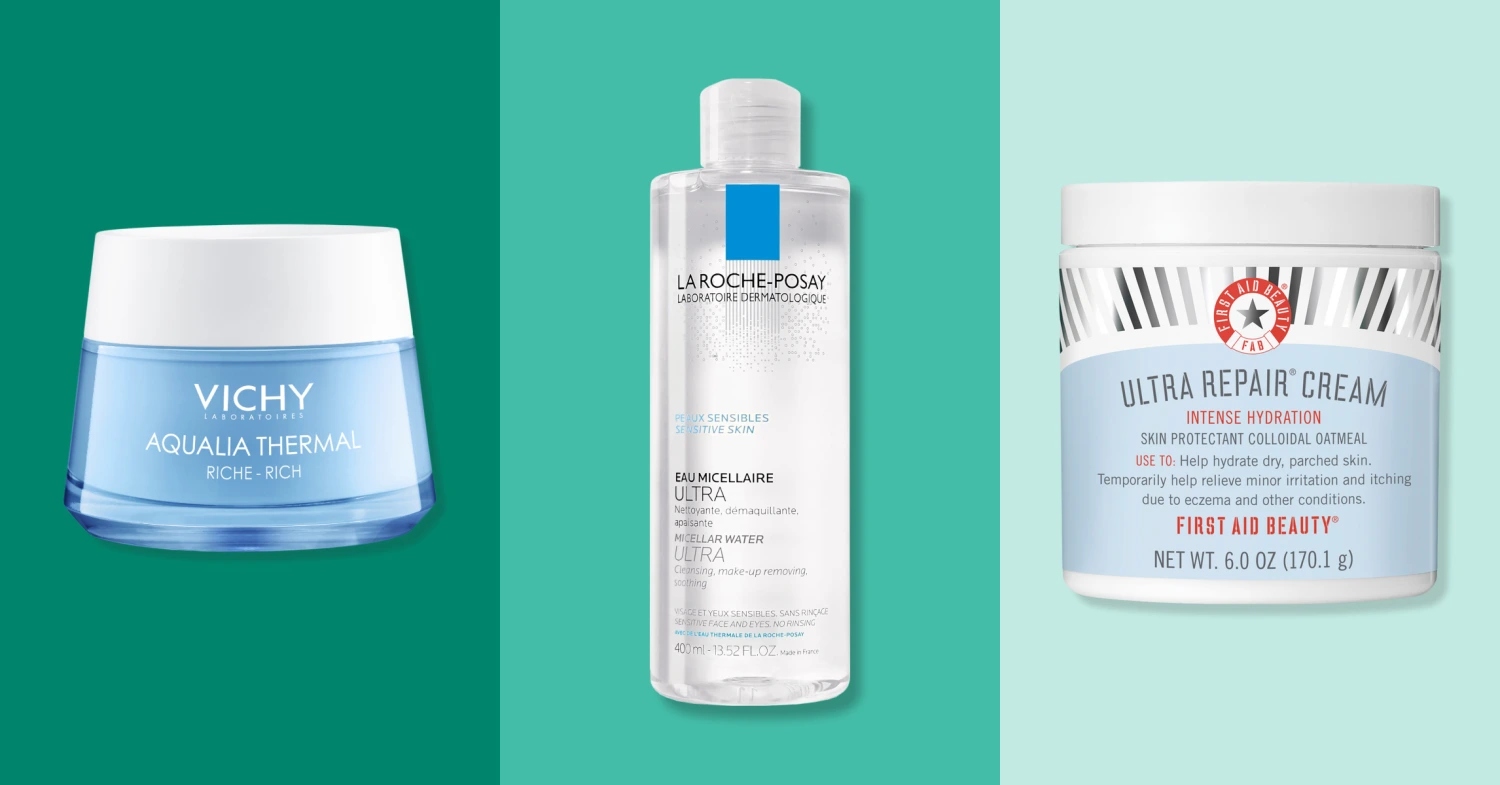Solutions For Sensitive Skin - 15 Gentle And Effective Tips
Discover effective solutions for sensitive skin. Expert tips and techniques for a calm, comfortable complexion.
Author:Daniel JamesReviewer:Karan EmeryMar 05, 202411 Shares11.4K Views

Sensitive skin can be a challenge to manage, as it often reacts adversely to various environmental factors, skincare products, and lifestyle habits. Individuals with sensitive skin may experience symptoms such as redness, itching, dryness, or irritation when exposed to certain triggers. Finding solutions for sensitive skininvolves identifying and avoiding potential irritants, implementing a gentle skincare routine, and making lifestyle adjustments to promote skin health and comfort.
Understanding Sensitive Skin
Sensitive skin is a common condition characterized by heightened reactivity to external stimuli. This can include factors such as harsh weather conditions, allergens, fragrances, and certain skincare ingredients. Individuals with sensitive skin may experience discomfort, inflammation, and visible skin reactions in response to these triggers.
Here are solutions for sensitive skin:
Choosing Gentle Skincare Products
When selecting skincare products for sensitive skin, it's essential to choose gentle, non-irritating formulations that are free from potential allergens and irritants. Look for products labeled as "hypoallergenic," "fragrance-free," "alcohol-free," and "sensitive skin-friendly." Opt for mild cleansers, hydrating moisturizers, and soothing treatments designed specifically for sensitive skin.
Avoiding Harsh Ingredients
Ingredients like alcohol, fragrances, dyes, and preservatives can be particularly irritating for sensitive skin. Read product labels carefully and avoid products containing these ingredients. Instead, opt for products with simple, minimal ingredient lists that are less likely to cause irritation.
Performing Patch Tests
Before applying new skincare products to your face, perform a patch test on a small area of skin to check for any adverse reactions. Apply a small amount of product to the inner forearm or behind the ear and wait 24-48 hours to see if any redness, itching, or irritation occurs.
Use Moisturizers
Lotions and moisturizers that are hypoallergenic can lessen dryness without upsetting delicate skin. The kind of sensitivity will determine which components are more effective than others.
For example, urea or lactic acid may work effectively for individuals with extremely dry skin. For certain people, some basic oils, like coconut oil or shea butter, may be more effective. Before using a product on the entire affected region of skin, it is usually advisable to test it on a tiny portion of the skin.
Using Sun Protection
Sun exposure can exacerbate sensitivity and trigger skin reactions in individuals with sensitive skin. Protect your skin from UV damage by wearing sunscreen with broad-spectrum protection and a high SPF rating. Choose physical sunscreens containing zinc oxide or titanium dioxide, which are less likely to cause irritation than chemical sunscreens.
Implementing A Simple Skincare Routine
Keep your skincare routine simple and consistent to minimize the risk of irritation. Cleanse your skin twice daily with a gentle, fragrance-free cleanser, followed by a soothing toner and a hydrating moisturizer. Avoid using too many products or harsh treatments that may strip the skin's natural moisture barrier.
Using Gentle Cleansing Techniques
When cleansing sensitive skin, use gentle, non-abrasive techniques to avoid further irritation. Use lukewarm water instead of hot water, and avoid scrubbing or rubbing the skin too harshly. Pat your skin dry with a soft towel instead of rubbing it, which can exacerbate sensitivity.
Incorporating Soothing Ingredients
Look for skincare products containing soothing ingredients like aloe vera, chamomile, oatmeal, calendula, and green tea, which can help calm inflammation and reduce redness in sensitive skin. These ingredients have anti-inflammatory and antioxidant properties that promote skin healing and comfort.
Maintaining Skin Hydration
Proper hydration is essential for maintaining healthy skin and reducing sensitivity. Use a gentle, hydrating moisturizer formulated for sensitive skin to lock in moisture and prevent dryness and irritation. Look for products containing hyaluronic acid, glycerin, and ceramides, which help attract and retain moisture in the skin.
Avoiding Over-Exfoliation
While exfoliation is beneficial for removing dead skin cells and promoting cell turnover, over-exfoliating can irritate sensitive skin. Limit exfoliation to 1-2 times per week using gentle exfoliants like enzymes or mild chemical exfoliants, and avoid abrasive scrubs or harsh physical exfoliants.
Protecting Against Environmental Stressors
Environmental factors like pollution, smoke, and harsh weather conditions can exacerbate sensitivity and trigger skin reactions. Protect your skin by wearing protective clothing, using a barrier cream or ointment, and avoiding prolonged exposure to environmental pollutants.
Managing Stress
Stress can worsen skin sensitivity and trigger inflammatory responses in the body. Practice stress-management techniques like meditation, deep breathing, yoga, or mindfulness to help reduce stress levels and promote overall skin health.
Seeking Professional Advice
If you're struggling to manage sensitive skin or experiencing persistent symptoms despite your efforts, consider seeking advice from a dermatologist or skincare professional. They can assess your skin condition, identify potential triggers, and recommend appropriate treatments or skincare products tailored to your specific needs.
Being Patient And Persistent
Finding solutions for sensitive skin can be a process of trial and error, and it may take time to identify the best products and techniques for your skin. Be patient and persistent in your skincare efforts, and don't be afraid to adjust your routine as needed to achieve optimal results.
Medical Treatments
Doctors could recommend a variety of drugs, depending on the underlying reason of the sensitive skin and any associated symptoms. Among them are:
- Steroid creams - Hydrocortisone and other over-the-counter (OTC) and prescription-strength steroid creams can help reduce itching and inflammation. They shouldn't be applied to the face.
- Analgesic creams -By lessening itching, numbing creams may helpTrusted Source people avoid scratching or irritating the region.
- Antihistamines -Taking an oral antihistamine, like Benadryl (diphenhydramine), may assist in treating certain allergic reactions.
- Protective sunscreen - Broad-spectrum sunscreens with an SPF of 30 or higher can help shield delicate skin from ultraviolet (UV) radiation.
Solutions For Sensitive Skin - FAQs
What Are The Best Solutions For Sensitive Skin?
The best solutions for sensitive skin include using gentle, fragrance-free skincare products, avoiding harsh ingredients, and practicing soothing techniques to calm inflammation and reduce redness.
What Ingredients Should I Avoid If I Have Sensitive Skin?
Individuals with sensitive skin should avoid harsh ingredients like fragrances, alcohol, sulfates, and preservatives, as these can cause irritation and exacerbate sensitivity.
How Can I Treat Sensitive Skin?
- Steer clear of really hot showers.
- Pick body wash, face wash, moisturizer, and sunscreen that is especially made for sensitive skin if you have sensitive skin.
- Stay away from perfumes.
- Steer clear of perfumed laundry detergents and cosmetics.
- Regularly moisturize your skin to avoid dryness.
What Is Best For Sensitive Skin?
Oftentimes, things like alcohol, sulfates, synthetic colors, and fragrances can irritate sensitive skin. Rather, choose items marked as "fragrance-free" or "hypoallergenic" to be sure they are safe for delicate skin. Look for lightweight moisturizers that won't clog pores if you have sensitive, oily skin.
What Is The Best Advice For Sensitive Skin?
When it comes to sensitive skin, hydration is essential. Maintaining sufficient moisture levels will aid in the clear, tranquil feeling of your skin. Your sensitive skin will be more balanced if you moisturize twice a day and stay well-hydrated if you drink lots of water. Keep sipping, a lovely bottle on your desk is a nice reminder!
Why Is My Skin So Sensitive?
Skin sensitivity can be brought on by soaps, detergents for laundry, perfumes, and skin care products. Skin irritation can result from exposure to the sun, wind, and cold. We can become more prone to skin irritation as we age. Additionally, skin sensitivity may indicate a hidden medical issue.
What Are Some Natural Remedies For Sensitive Skin?
Natural remedies for sensitive skin include applying aloe vera gel, chamomile tea compresses, and oatmeal masks to soothe inflammation and reduce redness.
Can I Wear Makeup If I Have Sensitive Skin?
Yes, individuals with sensitive skin can wear makeup, but it's essential to choose products specifically formulated for sensitive skin and to remove makeup gently with a mild cleanser.
Conclusion
Managing sensitive skin requires a combination of solutions for sensitive skin including gentle skincare products, lifestyle adjustments, and patience. By identifying triggers, choosing suitable skincare products, and implementing soothing techniques, you can effectively manage sensitivity and achieve a comfortable, healthy complexion.
Jump to
Understanding Sensitive Skin
Choosing Gentle Skincare Products
Avoiding Harsh Ingredients
Performing Patch Tests
Use Moisturizers
Using Sun Protection
Implementing A Simple Skincare Routine
Using Gentle Cleansing Techniques
Incorporating Soothing Ingredients
Maintaining Skin Hydration
Avoiding Over-Exfoliation
Protecting Against Environmental Stressors
Managing Stress
Seeking Professional Advice
Being Patient And Persistent
Medical Treatments
Solutions For Sensitive Skin - FAQs
Conclusion

Daniel James
Author
Daniel James is a distinguished gerontologist, author, and professional coach known for his expertise in health and aging.
With degrees from Georgia Tech and UCLA, including a diploma in gerontology from the University of Boston, Daniel brings over 15 years of experience to his work.
His credentials also include a Professional Coaching Certification, enhancing his credibility in personal development and well-being.
In his free time, Daniel is an avid runner and tennis player, passionate about fitness, wellness, and staying active.
His commitment to improving lives through health education and coaching reflects his passion and dedication in both professional and personal endeavors.

Karan Emery
Reviewer
Karan Emery, an accomplished researcher and leader in health sciences, biotechnology, and pharmaceuticals, brings over two decades of experience to the table. Holding a Ph.D. in Pharmaceutical Sciences from Stanford University, Karan's credentials underscore her authority in the field.
With a track record of groundbreaking research and numerous peer-reviewed publications in prestigious journals, Karan's expertise is widely recognized in the scientific community.
Her writing style is characterized by its clarity and meticulous attention to detail, making complex scientific concepts accessible to a broad audience. Apart from her professional endeavors, Karan enjoys cooking, learning about different cultures and languages, watching documentaries, and visiting historical landmarks.
Committed to advancing knowledge and improving health outcomes, Karan Emery continues to make significant contributions to the fields of health, biotechnology, and pharmaceuticals.
Latest Articles
Popular Articles

